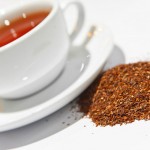African Rooibos Tea – Health Benefits

The leaves and twigs of rooibos are commercially harvested between January and March, which is summer time in South Africa. These are cut into small pieces, fermented in a process that is essentially an oxidation, and then sun-dried. Since the fermentatin turns the leaves a red-orange color, the sun-dried product is used to make a red tea.
An alternative treatment of the leaves and twigs does not include the fermentation or oxidations step and produces what is referred to as green rooibos. The tea made from unfermented rooibos has a yellow tan color. The green tea possesses a milder taste, while the red tea has a stronger taste described as sweet and fruity. Both teas are available either plain or flavored.
Green rooibos is often preferred because it contains a considerable higher level of antioxidants. The fermentation step does decrease the antioxidant activity of the tea, possible due to the 25% loss of polyphenolics during the process.
Nutritional Value
In spite of the many claims that have been made, rooibos is not a good source of vitamin C and has very little of most minerals. A 200 ml cup of the red tea provides less than 2 percent of most of the minerals. Exceptions to this are flouride and copper, which appear in significant amounts in rooibos tea.
Advantages
In addition to its high level of polyphenolic antioxidants, another reason that rooibos has become a popular health beverage is that it is a mild-tasting tea that is totoally caffeine-free. This gives it a distinct advantage over regular green and black tea made from Camellia sinensis.
The low tannin content of rooibos is an advantage for persons with digestive problems who have difficulty with tannin-rich beverages. Tannin binds iron and therefore reduce the absorption of non-heme iron. This can be significant for those with marginal iron intake. Some teas like black and peppermint tea may inhibit iron as much as 80 to 90 percent.
Anti-Spasmodic Effect
Possibly due to its high flavonoid content, rooibos is reported to have antispasmodic properties and is commonly used in South Africa to treat babies that have colic and stomach cramps. South Africans also use the tea for calming intestinal spasms and digestive upsets in adults. Because it is rich in polypheonlic antioxidants, it is claimed that rooibos tea should protect one against cardiovascular disease. It has been found to be of some help in preventing diabetic vascular complications.
Possible Cancer Protection
Many of the flavonoids in rooibos have antimutagenic activity. Animal studies have shown that rooibos has potent antimutagenic activity, as well as immuno-modulating and cancer-protective action, however human studies are limited.
Rooibos has the ability to inhibit skin tumors. Its flavonoids can protect against unwanted genetic damage to cells. An extract of the tea had shown to augment antibody production with the generation of interleukin-10. At present, scientists are evaluating the effects of rooibos tea in providing protection against liver and colon cancer. It can activate an enzyme system known for its ability to clear the body of cancer-causing agents.
Other Health Properties
Rooibos tea is commonly used for respiratory disorders. The tea is rich in flavonoids that provide selective bronchodilator effects and anti-inflammatory activity. Some have claimed that rooibos can also help with allergies, eczema, and other ailments but many of the health claims made for rooibos have not been verified by scientific research. A Japanese study did establish that patients with dermatitis showed a significant decrease in itching when using rooibos.
The antioxidant of rooibos tea may be useful in helping to prevent the changes in the aging brain. Experiments have revealed that rooibos tea can prevent age-related accumulation of lipid oxidation products in several regions of the brain of rats. If this can also be shown to be true for humans, rooibos could prove useful as an anti-aging agent.
Author: Winston Craig, MPH,PhD,RD.
Source: www.vegetarian-nutrition.info/herbs/rooibos.php
TIDBIT: To read part one of this article and to stay up to date on the latest additions to our store, you can sign up for our Tin Roof Teas newsletter. This can be done through one of our Tea Consultants the next time your in the store or through our Facebook page.

